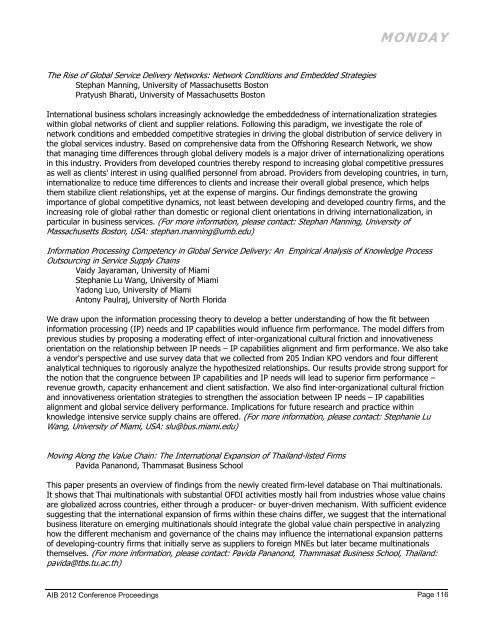AIB 2012 Conference Proceedings - Academy of International ...
AIB 2012 Conference Proceedings - Academy of International ...
AIB 2012 Conference Proceedings - Academy of International ...
You also want an ePaper? Increase the reach of your titles
YUMPU automatically turns print PDFs into web optimized ePapers that Google loves.
MONDAY<br />
The Rise <strong>of</strong> Global Service Delivery Networks: Network Conditions and Embedded Strategies<br />
Stephan Manning, University <strong>of</strong> Massachusetts Boston<br />
Pratyush Bharati, University <strong>of</strong> Massachusetts Boston<br />
<strong>International</strong> business scholars increasingly acknowledge the embeddedness <strong>of</strong> internationalization strategies<br />
within global networks <strong>of</strong> client and supplier relations. Following this paradigm, we investigate the role <strong>of</strong><br />
network conditions and embedded competitive strategies in driving the global distribution <strong>of</strong> service delivery in<br />
the global services industry. Based on comprehensive data from the Offshoring Research Network, we show<br />
that managing time differences through global delivery models is a major driver <strong>of</strong> internationalizing operations<br />
in this industry. Providers from developed countries thereby respond to increasing global competitive pressures<br />
as well as clients' interest in using qualified personnel from abroad. Providers from developing countries, in turn,<br />
internationalize to reduce time differences to clients and increase their overall global presence, which helps<br />
them stabilize client relationships, yet at the expense <strong>of</strong> margins. Our findings demonstrate the growing<br />
importance <strong>of</strong> global competitive dynamics, not least between developing and developed country firms, and the<br />
increasing role <strong>of</strong> global rather than domestic or regional client orientations in driving internationalization, in<br />
particular in business services. (For more information, please contact: Stephan Manning, University <strong>of</strong><br />
Massachusetts Boston, USA: stephan.manning@umb.edu)<br />
Information Processing Competency in Global Service Delivery: An Empirical Analysis <strong>of</strong> Knowledge Process<br />
Outsourcing in Service Supply Chains<br />
Vaidy Jayaraman, University <strong>of</strong> Miami<br />
Stephanie Lu Wang, University <strong>of</strong> Miami<br />
Yadong Luo, University <strong>of</strong> Miami<br />
Antony Paulraj, University <strong>of</strong> North Florida<br />
We draw upon the information processing theory to develop a better understanding <strong>of</strong> how the fit between<br />
information processing (IP) needs and IP capabilities would influence firm performance. The model differs from<br />
previous studies by proposing a moderating effect <strong>of</strong> inter-organizational cultural friction and innovativeness<br />
orientation on the relationship between IP needs – IP capabilities alignment and firm performance. We also take<br />
a vendor's perspective and use survey data that we collected from 205 Indian KPO vendors and four different<br />
analytical techniques to rigorously analyze the hypothesized relationships. Our results provide strong support for<br />
the notion that the congruence between IP capabilities and IP needs will lead to superior firm performance –<br />
revenue growth, capacity enhancement and client satisfaction. We also find inter-organizational cultural friction<br />
and innovativeness orientation strategies to strengthen the association between IP needs – IP capabilities<br />
alignment and global service delivery performance. Implications for future research and practice within<br />
knowledge intensive service supply chains are <strong>of</strong>fered. (For more information, please contact: Stephanie Lu<br />
Wang, University <strong>of</strong> Miami, USA: slu@bus.miami.edu)<br />
Moving Along the Value Chain: The <strong>International</strong> Expansion <strong>of</strong> Thailand-listed Firms<br />
Pavida Pananond, Thammasat Business School<br />
This paper presents an overview <strong>of</strong> findings from the newly created firm-level database on Thai multinationals.<br />
It shows that Thai multinationals with substantial OFDI activities mostly hail from industries whose value chains<br />
are globalized across countries, either through a producer- or buyer-driven mechanism. With sufficient evidence<br />
suggesting that the international expansion <strong>of</strong> firms within these chains differ, we suggest that the international<br />
business literature on emerging multinationals should integrate the global value chain perspective in analyzing<br />
how the different mechanism and governance <strong>of</strong> the chains may influence the international expansion patterns<br />
<strong>of</strong> developing-country firms that initially serve as suppliers to foreign MNEs but later became multinationals<br />
themselves. (For more information, please contact: Pavida Pananond, Thammasat Business School, Thailand:<br />
pavida@tbs.tu.ac.th)<br />
<strong>AIB</strong> <strong>2012</strong> <strong>Conference</strong> <strong>Proceedings</strong><br />
Page 116

















